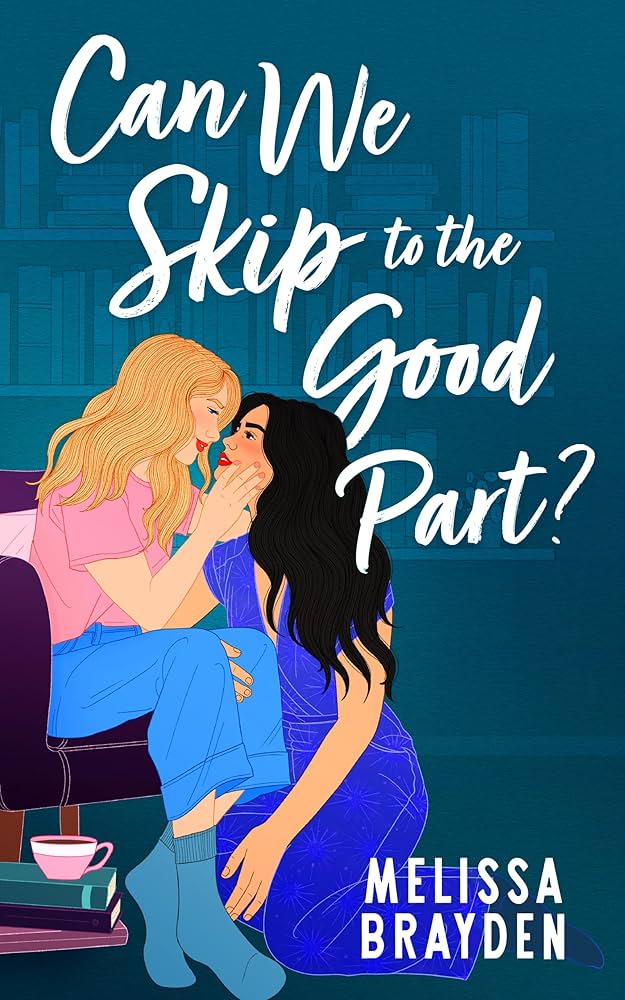
Can We Skip To The Good Part?
by Melissa Brayden
Recommended
I've mentioned previously my opinion that books written about books and bookstores are cheating and, while my distaste hasn't changed much, I am at least more willing to be forgiving when judging authorial intent. After all, with some outliers, it's not hard to imagine that most authors write books because they love books. They love reading, they love reading, they view bookstore as both respite and (literally) providing for their needs.
So I guess it makes sense why you might center a book around a book club, with heavy inserts about the joy of local bookstores, and even some meta-commentary on the very book you're reading (AM I INSIDE A ROMANCE NOVEL RIGHT NOW?)
(Well, yes, but not related to this book.)
Thus I cannot give Can We Skip to the Good Part? any more than a soft "recommended." It's a perfectly fine book, Brayden is a reliable author. She seemed to enoy upping the spiciness more than I remember from previous books – though that also may just be a fault in my memory; the last few romances I've ready have tended to stay around 1-2 "cooking" scenes (is that how we're using this metaphor? Do we need to extend the metaphor fully or are good with the just singular euphemism?).
But I appreciate that she took her own criticism to heart, trying to liven up the plot a little and not rely on overly trope-y contrivances that veteran readers would know to expect. I think that's actually the reason I would still recommend this book, rather than the uber-qualified "maybe': its respect for fans of the genre. There are plenty of explainers, but this book was written with the frequent reader in mind. We get the explicit explication of dislike of having the Main Drama come from miscommunication; when the Big Drama comes, communication is so open it borders on the comedically superliminal.
It's funny, sometimes I struggle with the mid-ratings becuase there are many times where I think the book would be amazing ... if I hadn't just read one (or several) that aimed at or near the same target and succeeded better than the one I'm in now. Oftentimes I'm thankful I can find pieces, like those mentioned above, that are different and signifcant enough to provide the joy of artistry, that jagged little piece of reality that seeps through the fictional construct you find yourself snagged on, and appreciating.
So we will ignore the papyrosophistry of the book-book (and pity the poor cover artist who had to compete against the completely imaginary covers by one of the MCs) and revel instead in the relationships, the communication and connection we can get through a well-crafted romance, and instead celebrate the book (even if we're reading it electronically).
Synopsis
Ella Baker is tired of being an afterthought in her own life. First, her fiancé dumps her six days before the wedding. Then her family jets off on a world tour—without her. And just when she thinks it can’t get worse, her longtime employer forgets to lay her off...That is, until now. It’s time for a reinvention, starting with something totally out of character: joining a book club. Thank God for her best friend, Rachel, who’s always there with popcorn and wine. But when a kiss from a smart, gorgeous, and maddeningly irresistible book club member leaves Ella breathless, she’s stunned to learn the woman who just turned her world upside down is the very ex who broke Rachel’s heart. Max Wyler doesn’t believe in forever. As a divorce mediator, she’s built a career on helping people walk away amicably. The book club is just an escape—until new member Ella Baker arrives, all sunshine and sass, making Max question everything she thought she knew about love. There’s just one problem: Ella’s best friend is Max’s worst mistake. Which means those pretty blue eyes? Completely off-limits. Or at least, they should be.
